Ward A.W. The Cambridge History of British Foreign Policy. 1783-1919. Volume 3
Подождите немного. Документ загружается.


THE
DIPLOMATIC
SERVICE
595
carefully guarded
itself from
any suspicion
of
incurring
an initial
ob-
ligation.
An
Attache,
in
the
despatch
which
regularised
his
position,
was
warned
that it
gave
him
no claim
to
promotion.
Sir
Andrew
Buchanan,
who
subsequently
went
as
Ambassador
to
Petersburg,
told the
Committee that he was
employed
sixteen
years
before
he
received
the
Queen's
Commission,
which,
in
fact,
was
never
given
before a man had
attained
the
rank
of
Secretary
1
,
and,
further,
that,
at the
end of
over
twenty-five
years'
service,
he was
still
not
entitled
to
a
pension,
even
though
he had
been
appointed
to the
post
of
Minister
at
Madrid
2
.
A
diplomatic
career,
at
any
rate
in
its
earliest
and
latest
phases,
was
an
occupation
for a
man
with
a
competency.
A
candidate
for
nomination,
so
Malmesbury
told
the
Committee,
had
to
be
assured
of an income from
parents
or
relatives of
at
least
£200
a
year.
And
the
old
diplomatist,
mounting
the
last
rungs
of
the
diplomatic
ladder
and
representing
his
country
at
Vienna,
Peters-
burg
or
Paris,
had
still to
depend upon
his
private
purse
to find
the
last thousand
or
so of his
expenditure.
The
salary
of
the
British
Ambassador at the Court
of
the
Tuileries,
in
those
brilliant
days
of
the
Second
empire,
was
raised
from
£8000
to
£10,000;
but
Cowley
had
to make it
up
to
£13,000
out
of
his own
pocket
before
he could
provide
for the
large
hospitality
and considerable
display required
of him
3
.
Hamilton
Seymour
at
Vienna
and
Petersburg,
where
the salaries
had
been
put up
to
£6000
a
year,
besides
£800
or
£900
allowed for
house-rent,
had fared better
than
this, but,
nevertheless,
declared
it
impossible
to
live within
his
official
means
4
.
Only
in
the middle
stage
of
his
career,
as a Minister at
a
small
Court,
had
he found
the
salary
adequate
and
the
profession
a
paying
one. The
Committee were
impressed,
and recommended that
the
official
income
of
the British
Ambassador
in Paris
be raised to
£12,000
and that of
the
Ambassadors
in
Vienna
and
Petersburg
to
£9000
each. These were
then
the three
imperial
capitals.
Elsewhere,
Embassies
should,
they thought, carry
salaries
of
£5000,
and
Legations
of the
first
class
offrom
£3000
to
£4000,
and of the second
class of
from
£1000
to
£2500;
but
these
figures
were
to be
independent
of certain
allowances for
house-rent
and
other
purposes.
The Committee sat
at
an
interesting
moment
in
the
history
of
the
Diplomatic
Service.
A
few
years
earlier
5
,
and
contemporaneously
with the
establishment
of
the
entrance
examination
at
the
Foreign
1
Report
Select
Comtn.
Diplom.
Service, 1861,
Min.
of
Ev.,
Q.
2457.
2
Ibid.
Q.
1116.
3
Ibid.
Q.
2511.
*
Ibid.
pp.
202,
203.
*
Between
1855
and
1857.
38-2
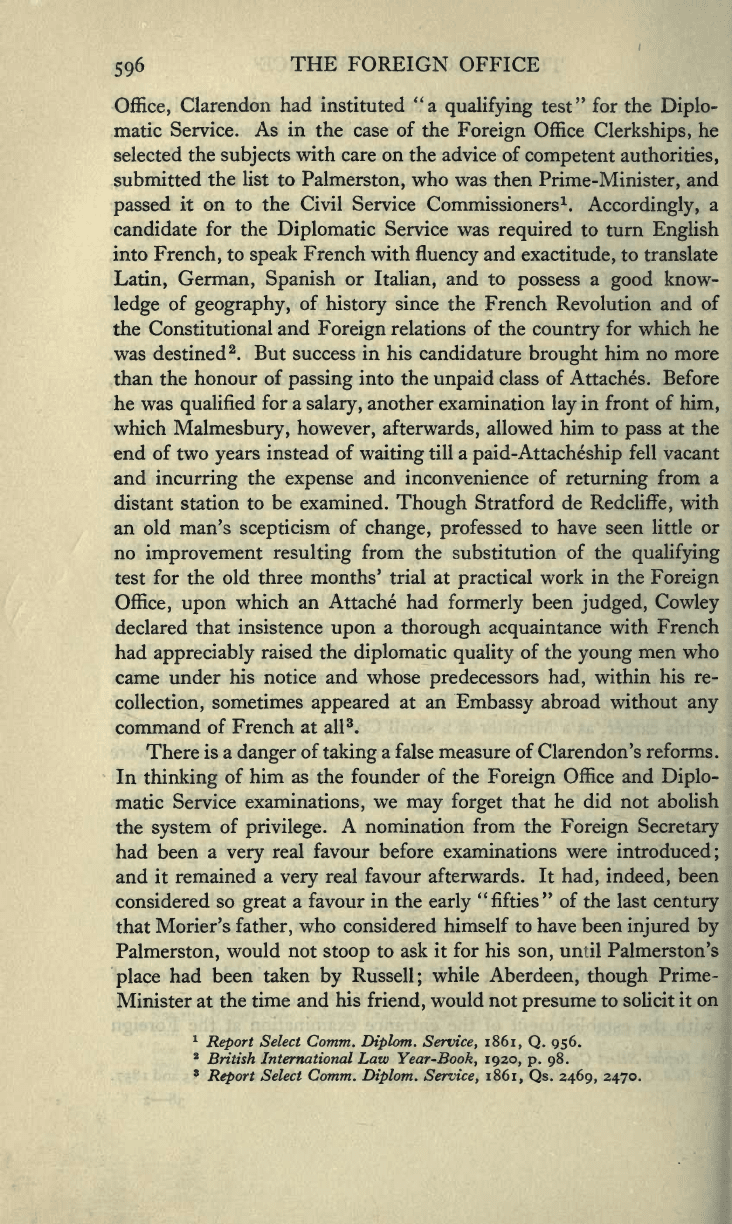
596
THE
FOREIGN OFFICE
Office,
Clarendon
had
instituted
"a
qualifying
test"
for
the
Diplo-
matic
Service.
As
in
the
case of
the
Foreign
Office
Clerkships,
he
selected
the
subjects
with
care
on
the advice of
competent
authorities,
submitted
the list
to
Palmerston,
who was
then
Prime-Minister,
and
passed
it
on
to the
Civil Service
Commissioners
1
.
Accordingly,
a
candidate
for
the
Diplomatic
Service was
required
to turn
English
into
French,
to
speak
French
with
fluency
and
exactitude,
to translate
Latin, German,
Spanish
or
Italian,
and to
possess
a
good
know-
ledge
of
geography,
of
history
since
the
French
Revolution
and
of
the Constitutional
and
Foreign
relations
of
the
country
for which he
was destined
2
.
But
success
in his
candidature
brought
him no
more
than the
honour of
passing
into
the
unpaid
class of
Attaches.
Before
he was
qualified
for a
salary,
another examination
lay
in
front
of
him,
which
Malmesbury,
however,
afterwards,
allowed him
to
pass
at the
end of
two
years
instead of
waiting
till
a
paid-Attacheship
fell vacant
and
incurring
the
expense
and
inconvenience
of
returning
from a
distant
station to
be
examined.
Though
Stratford de
Redcliffe,
with
an
old
man's
scepticism
of
change,
professed
to
have seen little
or
no
improvement
resulting
from
the substitution
of
the
qualifying
test
for
the
old three months' trial at
practical
work
in
the
Foreign
Office,
upon
which
an
Attache
had
formerly
been
judged,
Cowley
declared
that insistence
upon
a
thorough
acquaintance
with
French
had
appreciably
raised
the
diplomatic quality
of the
young
men who
came under
his
notice
and
whose
predecessors
had,
within
his
re-
collection,
sometimes
appeared
at
an
Embassy
abroad
without
any
command
of
French at all
3
.
There
is a
danger
of
taking
a
false
measure of Clarendon's
reforms.
In
thinking
of
him as
the founder
of
the
Foreign
Office
and
Diplo-
matic
Service
examinations,
we
may forget
that
he
did
not
abolish
the
system
of
privilege.
A
nomination
from the
Foreign
Secretary
had been
a
very
real
favour before examinations were
introduced;
and it
remained
a
very
real favour afterwards.
It
had,
indeed,
been
considered so
great
a
favour
in
the
early
"
fifties"
of
the last
century
that
Morier's
father,
who
considered himself to have been
injured
by
Palmerston,
would not
stoop
to
ask
it
for
his
son,
until Palmerston
's
place
had been
taken
by
Russell;
while
Aberdeen,
though
Prime-
Minister
at the
time
and
his
friend,
would not
presume
to solicit it
on
1
Report
Select Comm.
Diplom.
Service,
1861,
Q.
956.
2
British
International Law
Year-Book, 1920,
p. 98.
3
Report
Select Comm.
Diplom.
Service,
1861,
Qs.
2469, 2470.
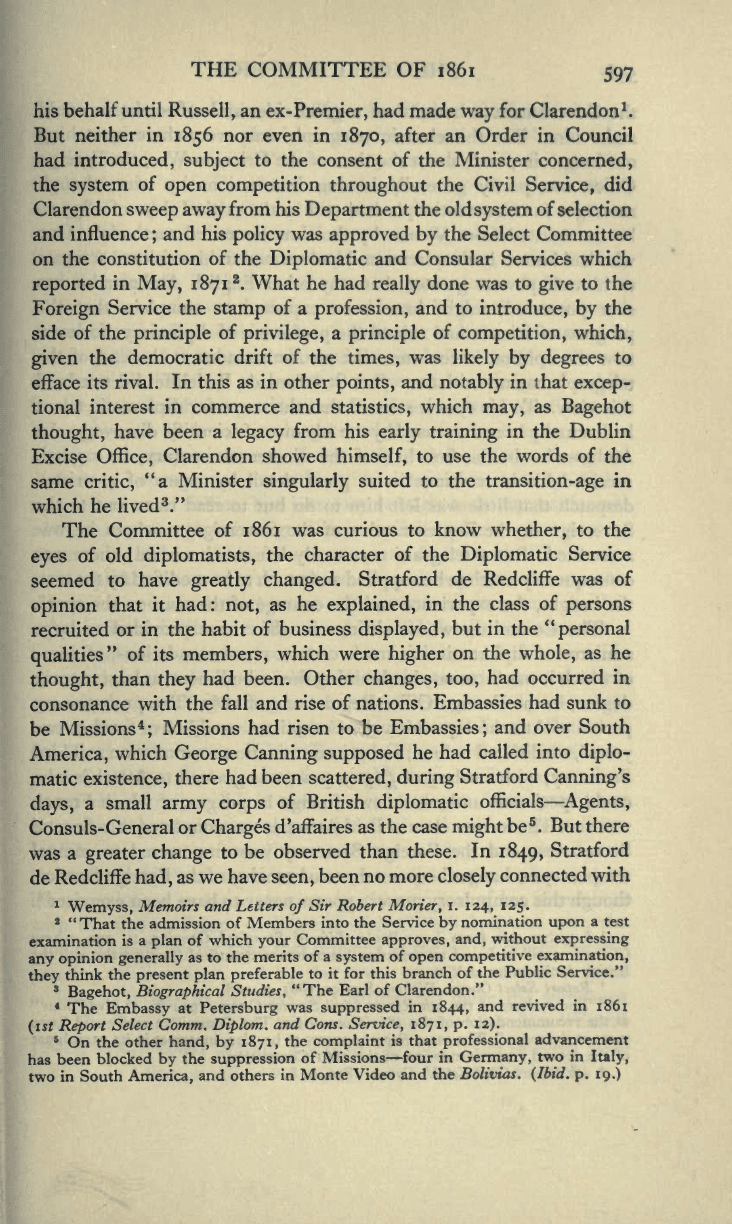
THE
COMMITTEE
OF 1861
597
his
behalf until
Russell,
an
ex-Premier,
had made
way
for Clarendon
1
.
But
neither
in
1856
nor
even in
1870,
after
an Order in
Council
had
introduced,
subject
to
the
consent
of
the
Minister
concerned,
the
system
of
open competition
throughout
the Civil
Service,
did
Clarendon
sweep
away
from his
Department
the
old
system
of
selection
and
influence
;
and his
policy
was
approved by
the
Select Committee
on the
constitution
of
the
Diplomatic
and Consular
Services which
reported
in
May,
1871
2
.
What he had
really
done
was
to
give
to the
Foreign
Service
the
stamp
of a
profession,
and to
introduce,
by
the
side
of the
principle
of
privilege,
a
principle
of
competition,
which,
given
the
democratic drift
of
the
times,
was
likely
by degrees
to
efface
its
rival.
In
this
as
in
other
points,
and
notably
in
that
excep-
tional
interest
in
commerce
and
statistics,
which
may,
as
Bagehot
thought,
have
been a
legacy
from
his
early training
in
the
Dublin
Excise
Office,
Clarendon
showed
himself,
to
use the
words
of
the
same
critic,
"a Minister
singularly
suited
to the
transition-age
in
which
he
lived
3
."
The
Committee
of
1861 was curious to know
whether,
to
the
eyes
of
old
diplomatists,
the
character
of
the
Diplomatic
Service
seemed
to
have
greatly
changed.
Stratford de
Redcliffe
was of
opinion
that
it
had:
not,
as
he
explained,
in
the
class of
persons
recruited
or in the habit
of business
displayed,
but
in
the
"personal
qualities
"
of
its
members,
which were
higher
on
the
whole,
as
he
thought,
than
they
had been. Other
changes,
too,
had occurred in
consonance
with
the
fall
and
rise of nations.
Embassies
had sunk
to
be
Missions
4
;
Missions
had risen
to
be
Embassies;
and
over
South
America,
which
George
Canning
supposed
he
had called
into
diplo-
matic
existence,
there
had
been
scattered,
during
Stratford
Canning's
days,
a small
army
corps
of
British
diplomatic
officials
—
Agents,
Consuls-
General
or
Charges
d'affaires
as
the
case
might
be
5
. But there
was
a
greater
change
to
be observed than
these.
In
1849,
Stratford
de Redcliffe
had,
as we have
seen,
been
no
more
closely
connected
with
1
Wemyss,
Memoirs
and Letters
of
Sir
Robert
Morier,
I.
124,
125.
2
"That
the
admission
of Members
into the
Service
by
nomination
upon
a
test
examination
is
a
plan
of
which
your
Committee
approves,
and,
without
expressing
any
opinion
generally
as
to the
merits
of
a
system
of
open
competitive
examination,
they
think
the
present plan preferable
to it
for
this
branch
of
the Public
Service."
3
Bagehot,
Biographical
Studies,
"The
Earl of Clarendon."
4
The
Embassy
at
Petersburg
was
suppressed
in
1844,
and
revived
in 1861
(1st
Report
Select
Comm.
Diplom.
and
Cons.
Service,
1871,
p.
12).
6
On
the
other
hand,
by 1871,
the
complaint
is
that
professional
advancement
has
been
blocked
by
the
suppression
of Missions
—
four
in
Germany,
two
in
Italy,
two
in
South
America,
and others
in Monte
Video
and the
Bolivias.
(Ibid.
p. 19.)
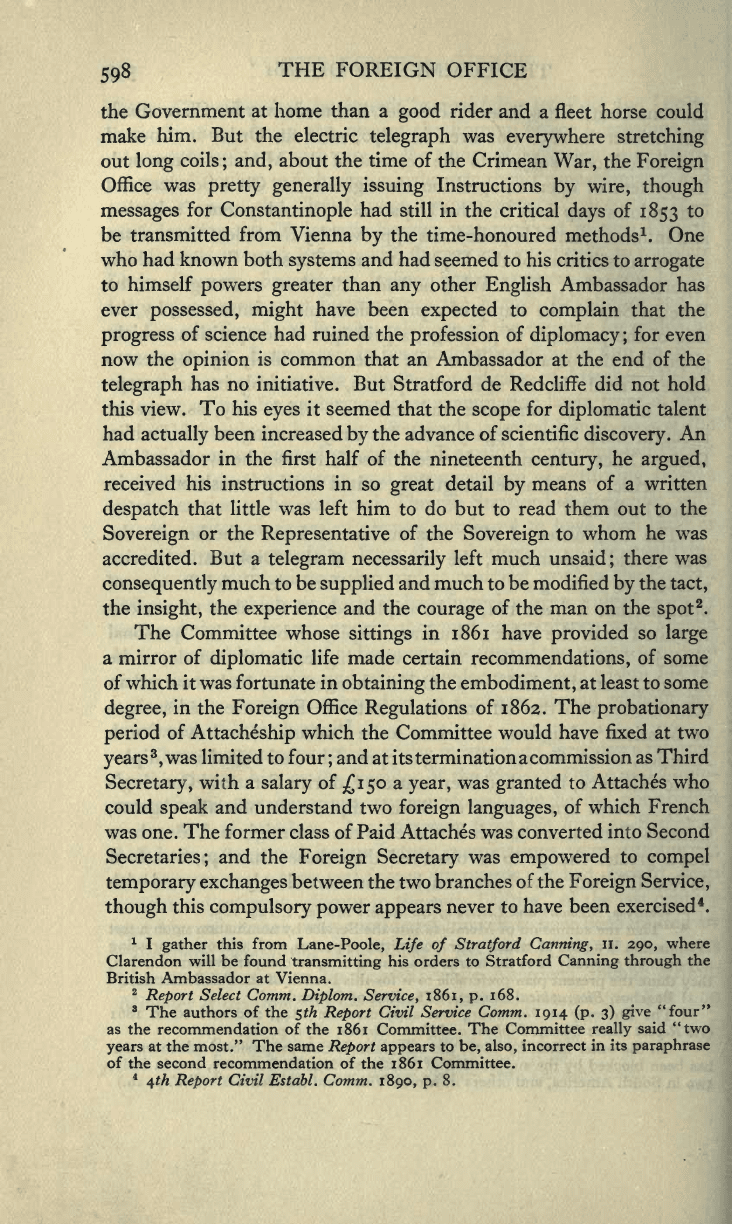
598
THE
FOREIGN
OFFICE
the
Government
at home than a
good
rider and
a
fleet
horse
could
make
him.
But the electric
telegraph
was
everywhere stretching
out
long
coils;
and,
about the time of
the Crimean
War,
the
Foreign
Office
was
pretty
generally issuing
Instructions
by
wire,
though
messages
for
Constantinople
had still in
the critical
days
of
1853
to
be transmitted
from Vienna
by
the time-honoured
methods
1
.
One
who
had known
both
systems
and had
seemed
to
his
critics
to
arrogate
to
himself
powers
greater
than
any
other
English
Ambassador
has
ever
possessed, might
have been
expected
to
complain
that the
progress
of
science
had ruined
the
profession
of
diplomacy
;
for even
now the
opinion
is
common
that
an
Ambassador at the
end of
the
telegraph
has no
initiative. But Stratford
de
Redcliffe
did
not
hold
this
view. To
his
eyes
it seemed that the
scope
for
diplomatic
talent
had
actually
been increased
by
the advance of scientific
discovery.
An
Ambassador in the
first
half of
the
nineteenth
century,
he
argued,
received
his
instructions
in so
great
detail
by
means
of a
written
despatch
that little
was
left
him
to do
but to
read
them out
to
the
Sovereign
or
the
Representative
of
the
Sovereign
to
whom he
was
accredited.
But a
telegram necessarily
left
much
unsaid;
there
was
consequently
much
to
be
supplied
and
much to be
modified
by
the
tact,
the
insight,
the
experience
and
the
courage
of
the
man on
the
spot
2
.
The
Committee
whose
sittings
in 1861
have
provided
so
large
a
mirror
of
diplomatic
life made
certain
recommendations,
of
some
of which it
was
fortunate
in
obtaining
the
embodiment,
at
least to
some
degree,
in
the
Foreign
Office
Regulations
of
1862.
The
probationary
period
of
Attacheship
which
the
Committee
would have
fixed
at
two
years
3
,
was
limited
to four
;
and
at
its
termination
a
commission
as Third
Secretary,
with
a
salary
of
£150
a
year,
was
granted
to Attaches
who
could
speak
and
understand two
foreign languages,
of which
French
was one. The former class of Paid
Attaches
was converted
into
Second
Secretaries;
and
the
Foreign
Secretary
was
empowered
to
compel
temporary
exchanges
between
the two
branches
of the
Foreign
Service,
though
this
compulsory power appears
never to
have been
exercised
4
.
1
I
gather
this
from
Lane-Poole,
Life of Stratford
Canning,
II.
290,
where
Clarendon
will be
found
transmitting
his orders to
Stratford
Canning
through
the
British
Ambassador
at Vienna.
2
Report
Select
Comm.
Diplom.
Service,
1861,
p.
168.
3
The
authors
of the
5th
Report
Civil Service
Comm.
1914
(p. 3)
give
"four"
as
the
recommendation
of
the 1861 Committee.
The Committee
really
said "two
years
at the
most."
The same
Report appears
to
be, also,
incorrect
in its
paraphrase
of
the
second recommendation
of the 1861
Committee.
4
4th
Report
Civil
Establ.
Comm.
1890, p.
8.
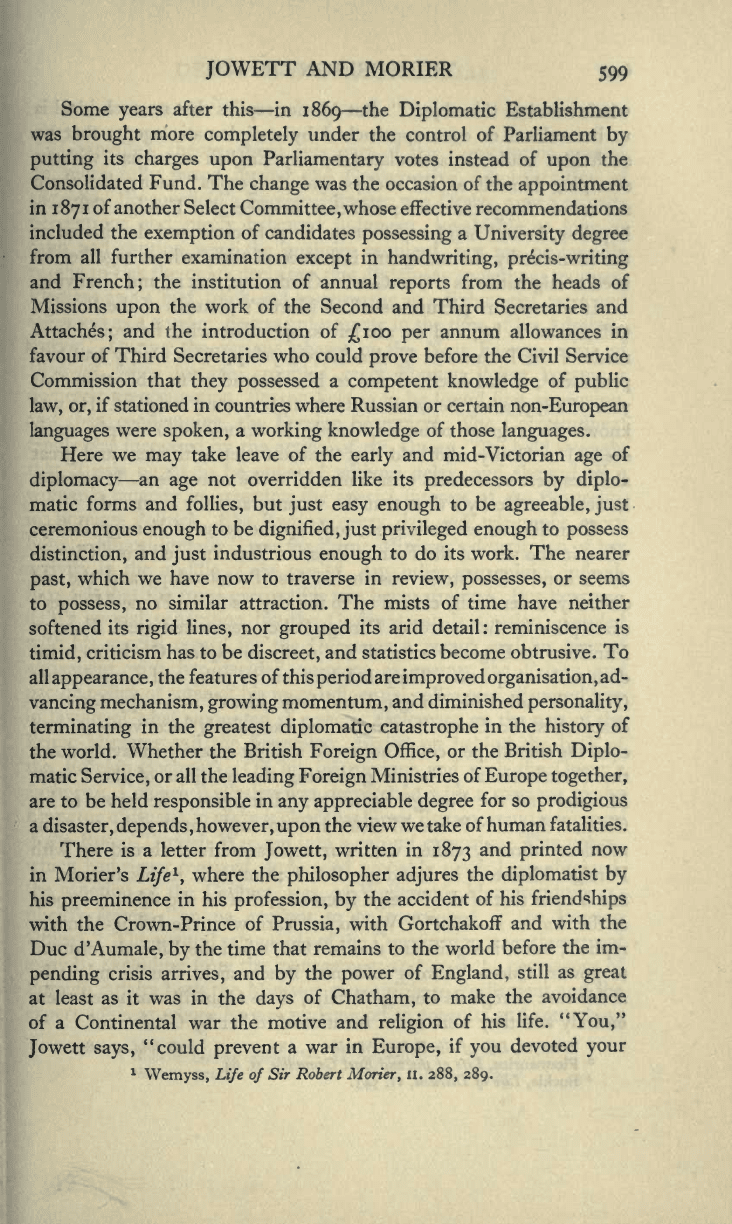
JOWETT
AND
MORIER
599
Some
years
after
this
—
in
1869
—
the
Diplomatic
Establishment
was
brought
more
completely
under
the
control
of Parliament
by
putting
its
charges upon
Parliamentary
votes
instead
of
upon
the
Consolidated
Fund.
The
change
was the occasion
of
the
appointment
in
1871
of
another
Select
Committee,
whose
effective recommendations
included
the
exemption
of
candidates
possessing
a
University degree
from all
further examination
except
in
handwriting,
precis-writing
and
French;
the
institution of annual
reports
from
the
heads of
Missions
upon
the
work of
the Second and Third
Secretaries
and
Attaches;
and
the
introduction
of
£100 per
annum allowances in
favour of Third
Secretaries who could
prove
before the Civil
Service
Commission
that
they possessed
a
competent
knowledge
of
public
law, or,
if
stationed
in
countries
where Russian or certain
non-European
languages
were
spoken,
a
working
knowledge
of
those
languages.
Here
we
may
take
leave of
the
early
and
mid-Victorian
age
of
diplomacy
—
an
age
not overridden like
its
predecessors
by
diplo-
matic
forms
and
follies,
but
just easy
enough
to
be
agreeable,
just
ceremonious
enough
to
be
dignified,
just
privileged
enough
to
possess
distinction,
and
just
industrious
enough
to
do its
work. The nearer
past,
which
we have now to traverse in
review,
possesses,
or seems
to
possess,
no similar attraction.
The
mists
of time have neither
softened
its
rigid
lines,
nor
grouped
its arid detail
: reminiscence is
timid,
criticism
has
to
be
discreet,
and
statistics
become obtrusive.
To
all
appearance,
the features
of
this
period
are
improved organisation,
ad-
vancing
mechanism,
growing
momentum,
and
diminished
personality,
terminating
in
the
greatest
diplomatic catastrophe
in
the
history
of
the
world. Whether
the
British
Foreign
Office,
or
the
British
Diplo-
matic
Service,
or all
the
leading Foreign
Ministries
of
Europe
together,
are
to be held
responsible
in
any appreciable degree
for so
prodigious
a
disaster,
depends,
however,
upon
the
view we take
of
human
fatalities.
There is
a
letter
from
Jowett,
written
in
1873
and
printed
now
in Morier's
Life
1
,
where the
philosopher
adjures
the
diplomatist
by
his
preeminence
in
his
profession,
by
the
accident
of his
friendships
with the
Crown-Prince
of
Prussia,
with GortchakofF
and
with
the
Due
d'Aumale,
by
the time
that
remains to the
world
before
the
im-
pending
crisis
arrives,
and
by
the
power
of
England,
still
as
great
at least
as
it was
in
the
days
of
Chatham,
to
make
the
avoidance
of a
Continental war the
motive
and
religion
of his
life.
"You,"
Jowett
says,
"could
prevent
a war
in
Europe,
if
you
devoted
your
1
Wemyss,
Life of
Sir Robert
Morier,
n.
288,
289.
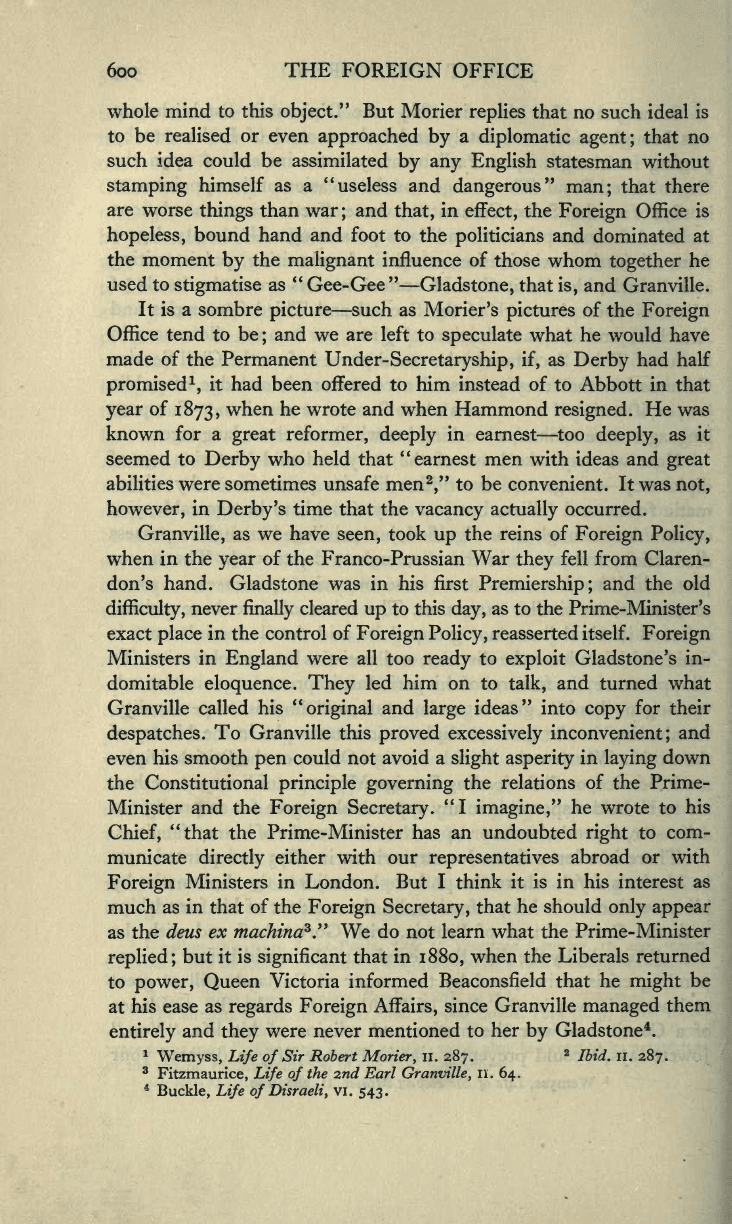
600
THE
FOREIGN
OFFICE
whole
mind to
this
object."
But Morier
replies
that
no
such ideal
is
to
be
realised
or
even
approached
by
a
diplomatic
agent;
that
no
such
idea
could be
assimilated
by any English
statesman without
stamping
himself as a
"useless
and
dangerous"
man;
that
there
are
worse
things
than
war;
and
that,
in
effect,
the
Foreign
Office
is
hopeless,
bound hand and foot to the
politicians
and
dominated
at
the
moment
by
the
malignant
influence
of
those
whom
together
he
used
to
stigmatise
as
"
Gee-Gee
"
—
Gladstone,
that
is,
and
Granville.
It is
a
sombre
picture
—
such
as
Morier's
pictures
of
the
Foreign
Office
tend to
be;
and
we
are
left to
speculate
what
he
would have
made
of
the
Permanent Under-
Secretaryship,
if,
as
Derby
had half
promised
1
,
it had
been
offered
to
him
instead
of
to
Abbott
in
that
year
of
1873,
when
he
wrote and when Hammond
resigned.
He
was
known
for a
great
reformer,
deeply
in
earnest
—
too
deeply,
as
it
seemed to
Derby
who
held
that
"earnest
men
with ideas
and
great
abilities were sometimes unsafe men
2
,"
to
be
convenient. It was
not,
however,
in
Derby's
time that the
vacancy
actually
occurred.
Granville,
as we have
seen,
took
up
the
reins of
Foreign
Policy,
when in the
year
of
the
Franco-Prussian
War
they
fell from
Claren-
don's hand.
Gladstone
was in his
first
Premiership;
and
the
old
difficulty,
never
finally
cleared
up
to this
day,
as
to the Prime-Minister's
exact
place
in
the control
of
Foreign
Policy,
reasserted itself.
Foreign
Ministers
in
England
were
all
too
ready
to
exploit
Gladstone's
in-
domitable
eloquence. They
led
him
on to
talk,
and
turned what
Granville called
his
"original
and
large
ideas"
into
copy
for
their
despatches.
To Granville
this
proved
excessively
inconvenient;
and
even
his
smooth
pen
could
not
avoid a
slight asperity
in
laying
down
the
Constitutional
principle governing
the relations
of
the
Prime-
Minister
and
the
Foreign
Secretary.
"I
imagine,"
he
wrote to
his
Chief,
"that
the
Prime-Minister
has an
undoubted
right
to
com-
municate
directly
either with
our
representatives
abroad or with
Foreign
Ministers
in
London. But
I
think
it
is in his
interest
as
much
as
in
that
of
the
Foreign Secretary,
that
he should
only appear
as
the
deus
ex machina
3
"
We
do
not
learn
what
the
Prime-Minister
replied;
but
it is
significant
that
in
1880,
when the
Liberals
returned
to
power,
Queen
Victoria
informed
Beaconsfield
that
he
might
be
at
his ease
as
regards Foreign
Affairs,
since
Granville
managed
them
entirely
and
they
were
never mentioned
to
her
by
Gladstone
4
.
1
Wemyss, Life
of
Sir Robert
Morier,
11.
287.
2
Ibid.
11.
287.
3
Fitzmaurice,
Life
of
the
2nd
Earl
Granville,
II.
64.
4
Buckle, Life of
Disraeli,
VI.
543.
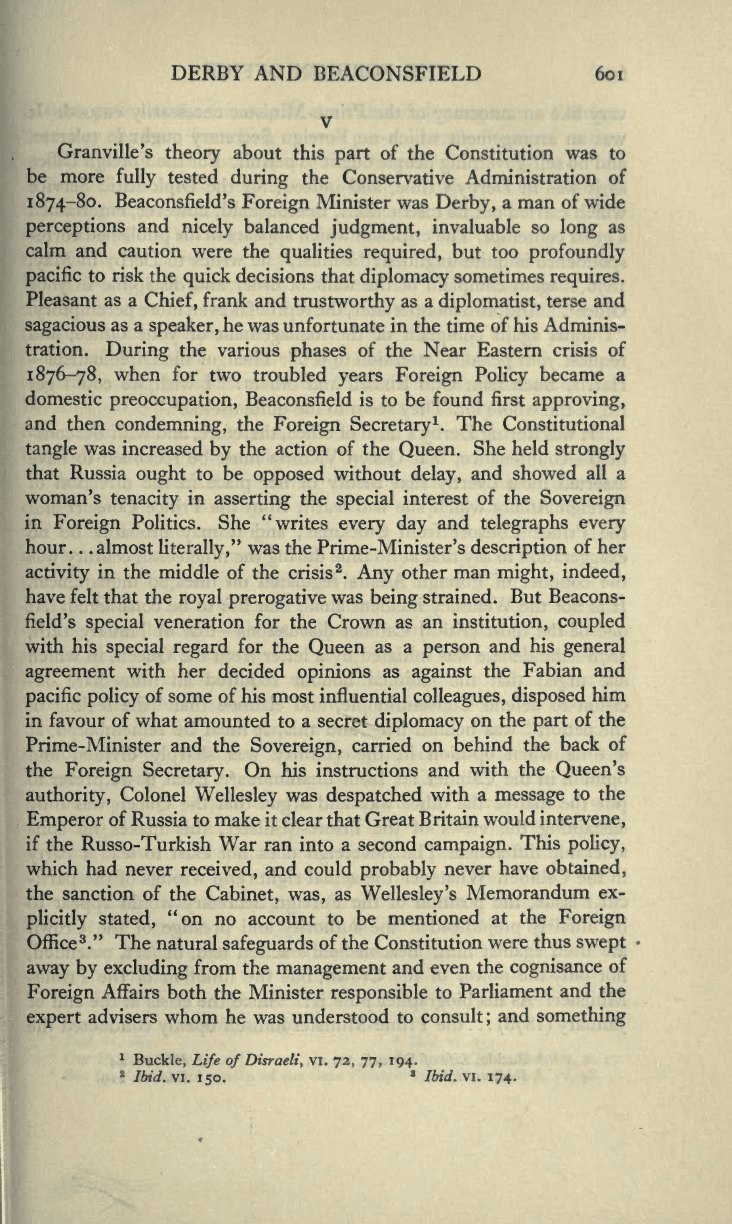
DERBY
AND
BEACONSFIELD
601
Granville's
theory
about
this
part
of
the Constitution
was
to
be more
fully
tested
during
the
Conservative Administration
of
1874-80.
Beaconsfield's
Foreign
Minister
was
Derby,
a
man of wide
perceptions
and
nicely
balanced
judgment,
invaluable
so
long
as
calm and
caution
were
the
qualities required,
but
too
profoundly
pacific
to
risk
the
quick
decisions
that
diplomacy
sometimes
requires.
Pleasant
as
a
Chief,
frank and
trustworthy
as
a
diplomatist,
terse
and
sagacious
as a
speaker,
he
was
unfortunate
in
the time
of
his
Adminis-
tration.
During
the various
phases
of
the
Near
Eastern
crisis of
1876-78,
when for
two troubled
years Foreign Policy
became
a
domestic
preoccupation,
Beaconsfield is
to
be found
first
approving,
and
then
condemning,
the
Foreign Secretary
1
.
The
Constitutional
tangle
was
increased
by
the
action of
the
Queen.
She held
strongly
that
Russia
ought
to
be
opposed
without
delay,
and
showed
all
a
woman's
tenacity
in
asserting
the
special
interest
of
the
Sovereign
in
Foreign
Politics.
She
"writes
every
day
and
telegraphs
every
hour. .
.almost
literally,"
was
the
Prime-Minister's
description
of her
activity
in
the middle of
the
crisis
2
.
Any
other
man
might,
indeed,
have
felt that
the
royal prerogative
was
being
strained.
But
Beacons-
field's
special
veneration for
the
Crown
as an
institution,
coupled
with his
special
regard
for
the
Queen
as a
person
and his
general
agreement
with
her
decided
opinions
as
against
the
Fabian
and
pacific
policy
of
some
of
his
most influential
colleagues,
disposed
him
in favour of
what
amounted
to
a
secret
diplomacy
on
the
part
of
the
Prime-Minister
and
the
Sovereign,
carried
on behind
the
back
of
the
Foreign Secretary.
On his
instructions
and with
the
Queen's
authority,
Colonel
Wellesley
was
despatched
with
a
message
to the
Emperor
of Russia
to
make it clear
that
Great
Britain
would
intervene,
if
the
Russo-Turkish War
ran
into
a second
campaign.
This
policy,
which had
never
received,
and could
probably
never
have
obtained,
the
sanction of
the
Cabinet, was,
as
Wellesley
's
Memorandum
ex-
plicitly
stated,
"on
no account to
be mentioned
at
the
Foreign
Office
3
." The
natural
safeguards
of
the
Constitution
were
thus
swept
away by
excluding
from
the
management
and even the
cognisance
of
Foreign
Affairs
both
the
Minister
responsible
to
Parliament
and
the
expert
advisers whom
he was
understood to
consult
;
and
something
1
Buckle,
Life
of
Disraeli,
vi.
72, 77, 194.
2
Ibid.
vi.
150.
*
Ibid.
vi.
174-
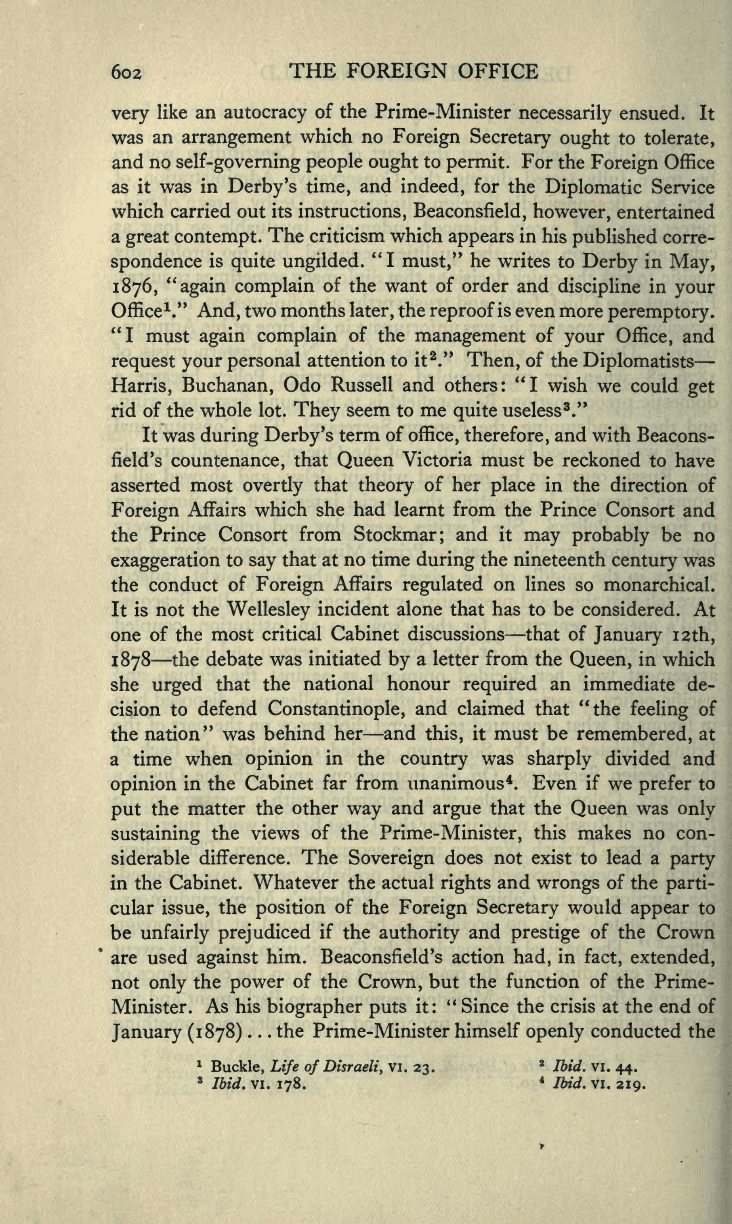
602
THE
FOREIGN
OFFICE
very
like
an
autocracy
of the
Prime-Minister
necessarily
ensued.
It
was
an
arrangement
which no
Foreign
Secretary
ought
to
tolerate,
and
no
self-governing
people
ought
to
permit.
For
the
Foreign
Office
as it
was in
Derby's
time,
and
indeed,
for
the
Diplomatic
Service
which
carried out its
instructions,
Beaconsfield,
however,
entertained
a
great
contempt.
The
criticism
which
appears
in
his
published
corre-
spondence
is
quite ungilded.
"
I
must,"
he
writes to
Derby
in
May,
1876,
"
again
complain
of
the want of order
and
discipline
in
your
Office
1
."
And,
two
months
later,
the
reproof
is
even
more
peremptory.
"I
must
again
complain
of
the
management
of
your
Office,
and
request your
personal
attention
to it
2
."
Then,
of
the
Diplomatists
—
Harris, Buchanan,
Odo
Russell and
others:
"I
wish
we could
get
rid of
the
whole
lot.
They
seem
to
me
quite
useless
3
."
It was
during
Derby's
term
of
office,
therefore,
and
with
Beacons-
field's
countenance,
that
Queen
Victoria
must
be
reckoned
to have
asserted
most
overtly
that
theory
of her
place
in
the
direction
of
Foreign
Affairs which
she had
learnt
from
the
Prince
Consort
and
the
Prince Consort
from
Stockmar;
and
it
may
probably
be
no
exaggeration
to
say
that
at
no
time
during
the
nineteenth
century
was
the
conduct
of
Foreign
Affairs
regulated
on
lines so
monarchical.
It
is not the
Wellesley
incident
alone
that
has
to be
considered.
At
one
of
the
most critical
Cabinet discussions
—
that
of
January
12th,
1878
—
the debate
was initiated
by
a
letter
from
the
Queen,
in
which
she
urged
that the
national honour
required
an
immediate
de-
cision to
defend
Constantinople,
and
claimed
that
"the
feeling
of
the
nation"
was behind
her
—
and
this,
it must
be
remembered,
at
a
time
when
opinion
in
the
country
was
sharply
divided and
opinion
in
the Cabinet
far
from unanimous
4
.
Even if we
prefer
to
put
the
matter
the other
way
and
argue
that
the
Queen
was
only
sustaining
the views
of
the
Prime-Minister,
this makes no
con-
siderable
difference. The
Sovereign
does
not exist to lead a
party
in the Cabinet.
Whatever
the
actual
rights
and
wrongs
of
the
parti-
cular
issue,
the
position
of
the
Foreign Secretary
would
appear
to
be
unfairly
prejudiced
if
the
authority
and
prestige
of the
Crown
are used
against
him. Beaconsfield
's
action
had,
in
fact,
extended,
not
only
the
power
of
the
Crown,
but
the
function
of the Prime-
Minister.
As
his
biographer
puts
it:
"
Since the
crisis
at the end
of
January
(1878)
. . .
the
Prime-Minister
himself
openly
conducted the
1
Buckle,
Life of Disraeli,
vi.
23.
2
Ibid. vi.
44.
3
Ibid.
VI.
178.
4
Ibid.
VI.
219.
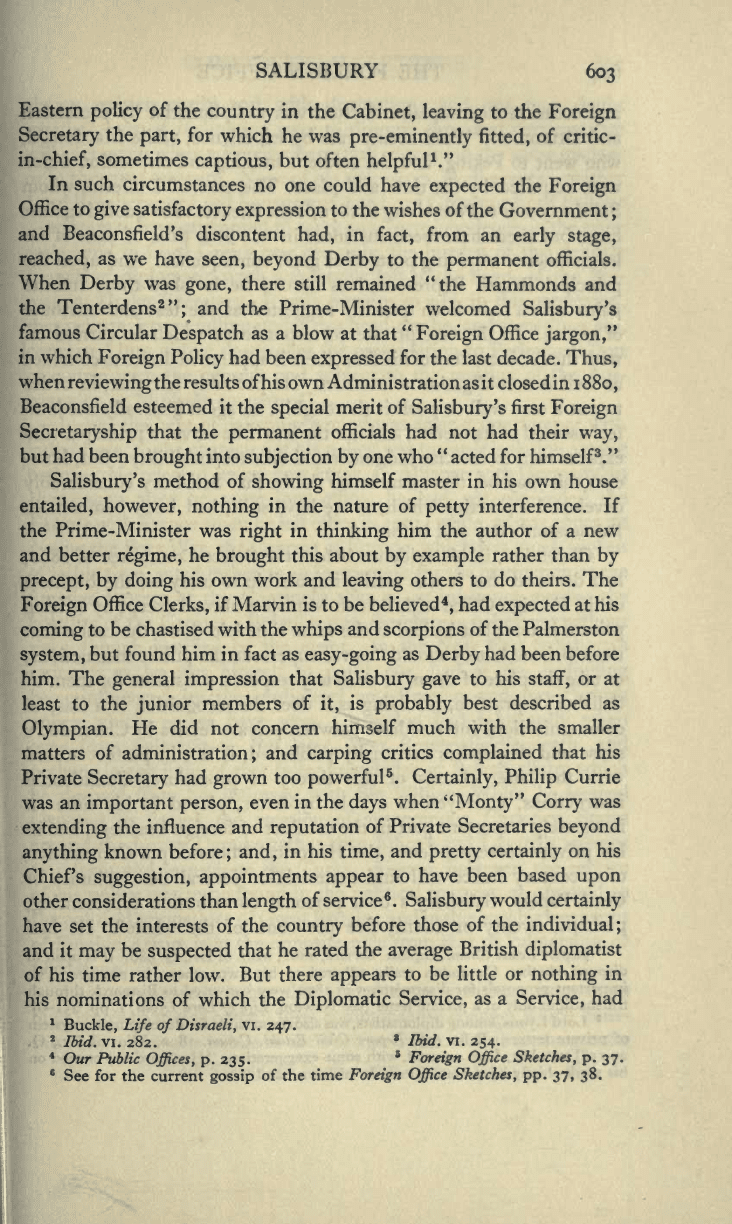
SALISBURY
603
Eastern
policy
of
the
country
in the
Cabinet,
leaving
to
the
Foreign
Secretary
the
part,
for
which he was
pre-eminently
fitted,
of
critic-
in-chief,
sometimes
captious,
but
often
helpful
1
."
In
such
circumstances no
one could have
expected
the
Foreign
Office to
give
satisfactory
expression
to the wishes of
the Government
;
and Beaconsfield's
discontent
had,
in
fact,
from an
early stage,
reached,
as
we
have
seen,
beyond
Derby
to the
permanent
officials.
When
Derby
was
gone,
there still
remained
"the
Hammonds and
the Tenterdens
2
"
;
and
the
Prime-Minister welcomed
Salisbury's
famous Circular
Despatch
as a blow
at
that
"
Foreign
Office
jargon,"
in which
Foreign
Policy
had
been
expressed
for
the last decade.
Thus,
when
reviewing
the results
of
his own
Administration as
it
closed in
1880,
Beaconsfield
esteemed
it the
special
merit
of
Salisbury's
first
Foreign
Secretaryship
that the
permanent
officials had
not
had their
way,
but
had
been
brought
into
subjection by
one who
"
acted
for
himself
3
."
Salisbury's
method of
showing
himself
master
in his own house
entailed, however,
nothing
in
the nature
of
petty
interference.
If
the Prime-Minister was
right
in
thinking
him
the author
of a
new
and
better
regime,
he
brought
this
about
by
example
rather than
by
precept, by
doing
his own work
and
leaving
others
to
do
theirs.
The
Foreign
Office
Clerks,
if
Marvin is
to
be believed
4
,
had
expected
at
his
coming
to
be chastised with the
whips
and
scorpions
of
the Palmerston
system,
but
found him in
fact
as
easy-going
as
Derby
had
been before
him. The
general
impression
that
Salisbury gave
to
his
staff,
or
at
least
to the
junior
members
of
it,
is
probably
best described
as
Olympian.
He did
not
concern
himself
much
with the
smaller
matters
of
administration;
and
carping
critics
complained
that
his
Private
Secretary
had
grown
too
powerful
5
.
Certainly,
Philip
Currie
was an
important person,
even
in
the
days
when
"Monty" Corry
was
extending
the
influence
and
reputation
of Private Secretaries
beyond
anything
known
before;
and,
in his
time,
and
pretty
certainly
on his
Chief's
suggestion, appointments
appear
to
have been
based
upon
other
considerations than
length
of
service
6
.
Salisbury
would
certainly
have
set
the
interests
of
the
country
before
those
of
the
individual
;
and
it
may
be
suspected
that
he
rated the
average
British
diplomatist
of his
time
rather
low.
But
there
appears
to
be little
or
nothing
in
his
nominations of which the
Diplomatic
Service,
as a
Service,
had
1
Buckle,
Life of Disraeli,
VI.
247.
2
Ibid. vi.
282.
8
Ibid.
vi.
254.
4
Our Public
Offices,
p. 235.
5
Foreign
Office
Sketches,
p. 37.
See for the
current
gossip
of the
time
Foreign
Office
Sketches,
pp.
37, 38.
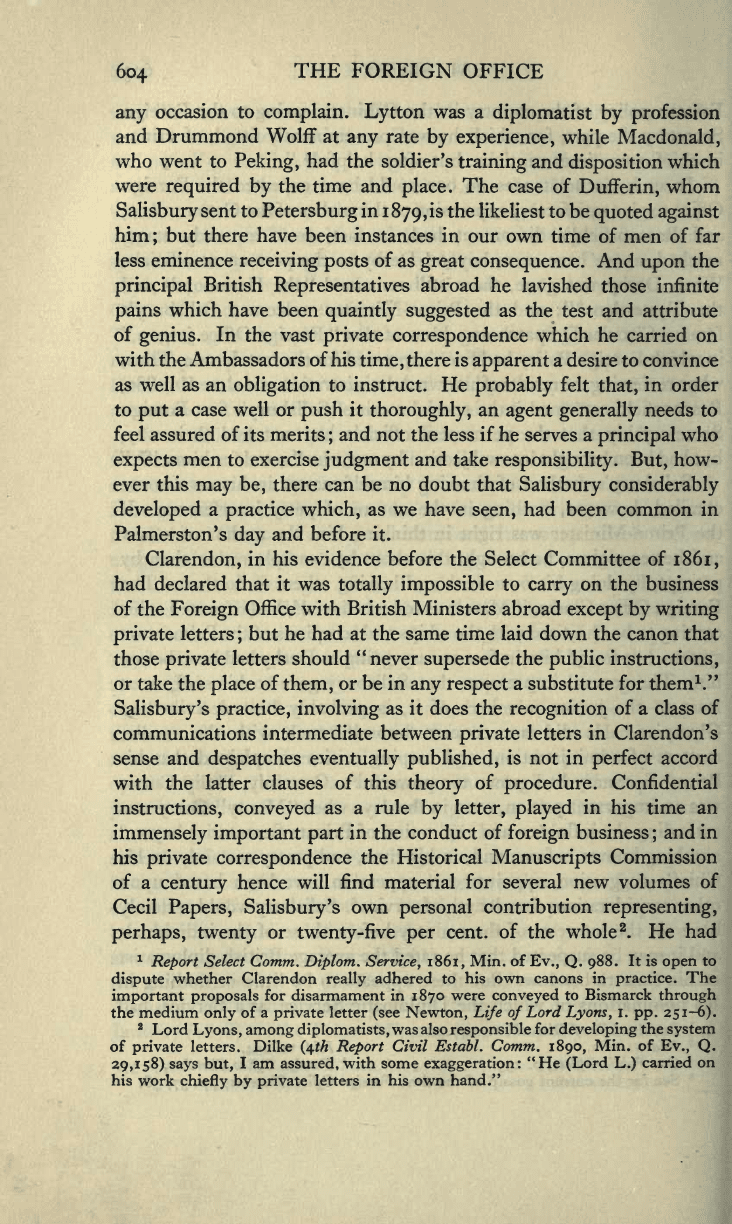
6o
4
THE
FOREIGN
OFFICE
any
occasion to
complain. Lytton
was a
diplomatist
by profession
and
Drummond
Wolff at
any
rate
by experience,
while
Macdonald,
who went to
Peking,
had
the soldier's
training
and
disposition
which
were
required by
the
time
and
place.
The
case of
Dufferin,
whom
Salisbury
sent to
Petersburg
in
1879,
is
tne
likeliest
to be
quoted
against
him
;
but there
have been
instances
in
our
own
time of men
of far
less eminence
receiving
posts
of
as
great
consequence.
And
upon
the
principal
British
Representatives
abroad
he
lavished
those infinite
pains
which have been
quaintly suggested
as
the
test
and
attribute
of
genius.
In
the
vast
private correspondence
which he
carried
on
with the Ambassadors of his
time,
there
is
apparent
a
desire to convince
as
well
as an
obligation
to
instruct.
He
probably
felt
that,
in
order
to
put
a case well or
push
it
thoroughly,
an
agent generally
needs to
feel assured of
its
merits
;
and
not the less if
he serves
a
principal
who
expects
men
to
exercise
judgment
and
take
responsibility.
But,
how-
ever this
may
be,
there
can be no
doubt that
Salisbury considerably
developed
a
practice
which,
as
we
have
seen,
had
been
common
in
Palmerston's
day
and before
it.
Clarendon,
in his
evidence
before the
Select Committee
of
1861,
had declared
that
it was
totally impossible
to
carry
on
the
business
of
the
Foreign
Office with British
Ministers
abroad
except
by
writing
private
letters
;
but
he had
at the
same
time
laid down
the
canon
that
those
private
letters
should "never
supersede
the
public
instructions,
or
take the
place
of
them,
or
be
in
any respect
a
substitute
for
them
1
."
Salisbury's practice, involving
as it does the
recognition
of a
class
of
communications
intermediate between
private
letters
in Clarendon's
sense and
despatches
eventually published,
is
not
in
perfect
accord
with
the
latter
clauses of
this
theory
of
procedure.
Confidential
instructions,
conveyed
as a rule
by
letter,
played
in
his
time
an
immensely important part
in
the
conduct
of
foreign
business
;
and
in
his
private correspondence
the Historical
Manuscripts
Commission
of a
century
hence
will find
material
for several new volumes
of
Cecil
Papers, Salisbury's
own
personal
contribution
representing,
perhaps, twenty
or
twenty-five
per
cent,
of
the
whole
2
. He
had
1
Report
Select Comm.
Diplom.
Service, 1861,
Min. of
Ev.,
Q.
988.
It
is
open
to
dispute
whether Clarendon
really
adhered
to
his own canons
in
practice.
The
important proposals
for
disarmament
in
1870
were
conveyed
to Bismarck
through
the medium
only
of
a
private
letter
(see
Newton,
Life of
Lord
Lyons,
I.
pp.
251-6).
2
Lord
Lyons, among diplomatists,
was
also
responsible
for
developing
the
system
of
private
letters. Dilke
(4th
Report
Civil Establ. Comm.
1890,
Min. of
Ev.,
Q.
29,158) says
but,
I am
assured,
with
some
exaggeration:
"He
(Lord
L.)
carried
on
his work
chiefly by private
letters
in
his own
hand."
